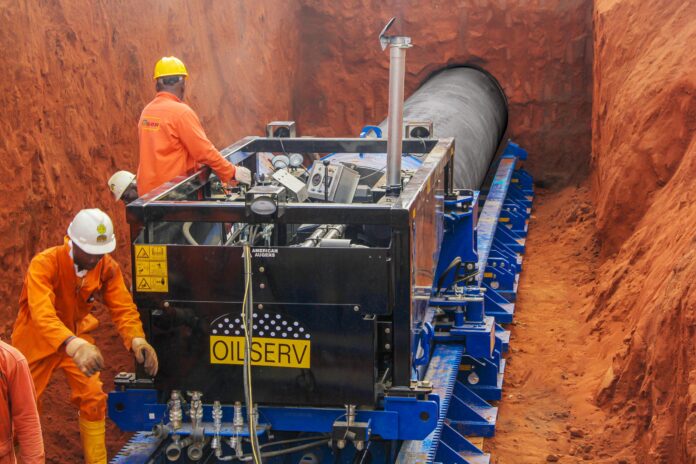Oilserv Limited, one of the three contractors working on the Ajaokuta-Kaduna-Kano (AKK) gas pipeline project, has achieved a significant milestone on its 303-kilometre section by successfully completing the River Niger crossing using cutting-edge Horizontal Directional Drilling (HDD) technology.
Oilserv Limited is targeting mechanical completion of its segment by the end of 2025. Executed by the Nigerian National Petroleum Company Limited (NNPC Ltd.), the AKK pipelinespans a total length of 614 kilometres.
Designed to transport natural gas from Ajaokuta through Kaduna and Abuja to Kano, the pipeline aims to boost power generation, industrialisation, and residential gas supply across Nigeria’s northern corridor.
Dr. Emeka Okwuosa, Group Chief Executive Officer of Oilserv Limited, revealed the successful crossing during a briefing with journalists in Abuja on Friday. He described the River Niger crossing as the most significant challenge in the project due to the river’s vast width—over two kilometers at the crossing point—and the environmental sensitivity of the area.
Dr. Okwuosa said, “To cross the River Niger without disturbing the water or the environment required us to employ Horizontal Directional Drilling, a trenchless technology that allows us to bore underground through consolidated formations.”
He added, “This method is similar in concept to the Channel Tunnel connecting England and France, where a curved underground path is created to avoid surface disruption.”
The Horizontal Directional Drilling (HDD) technique involves launching a drilling rig from the surface to create a curved underground tunnel through which the pipeline is installed. This approach minimizes environmental impact and avoids disturbing the riverbed, making it ideal for the sensitive ecosystem of the Niger River.
Oilserv’s 303-kilometre stretch covers the pipeline from Ajaokuta to the border between Kaduna State and Niger State, roughly half of the entire AKK pipeline length. The terrain along this route is notably challenging, featuring thick jungles, rocky outcrops, multiple river crossings, hills, cliffs, and busy roadways, including dual carriageways.
Security concerns, flooding, and logistical complexities—such as transporting large pipeline sections from the port to remote locations—have also posed significant hurdles. Despite these challenges, Oilserv has maintained steady progress, attributing its success to close collaboration with NNPC Ltd. and robust project management.
Dr. Okwuosa emphasised that the company’s local expertise and experience are critical to the project’s success. He said, “This project is a testament to Nigerian engineering capability. There is no other indigenous company of our size and capacity that can handle a project of this magnitude.”
According to Okwuosa, with the support from the Afreximbank and Fidelity Bank, Oilserv raises the money, achieves the milestone, puts in its bill/invoice while the NNPC pays.
In addition, he confirmed that the company is on track to achieve mechanical completion of its 303-kilometer segment by December 2025, a critical step toward the overall pipeline’s operational readiness.
The AKK pipeline is a cornerstone of Nigeria’s Gas Master Plan, aimed at harnessing the country’s vast natural gas resources to drive economic growth. By connecting gas supply from the resource-rich Ajaokuta region to northern industrial hubs and residential areas, the pipeline will support power generation, reduce energy costs, and encourage industrial development.




